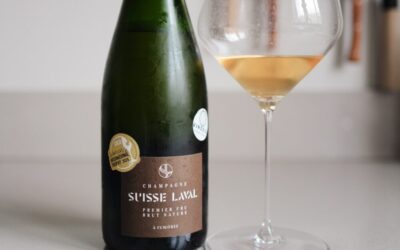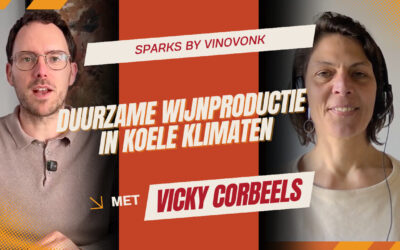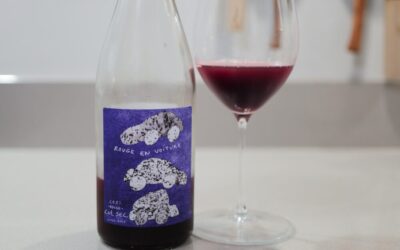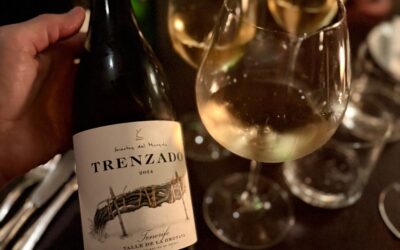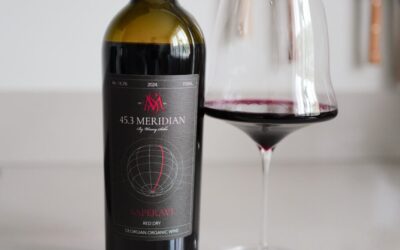When a package containing two elegant bottles arrived at my doorstep, I was immediately drawn to their sleek design and the thoughtful presentation box that accompanied each one. Little did I know I was about to discover Bouteille de Plaisir – a wine project that’s fundamentally reimagining how we celebrate special moments.
Recently, I had the pleasure of sitting down with Pascal Noordover, the visionary behind Bouteille de Plaisir, for a fascinating conversation and tasting session. As we uncorked both the alcohol-free and traditional versions of his sparkling wines, I discovered not just exceptional bubbles, but a philosophy about capturing moments that resonated deeply with me.
A Philosophy Written in Cork
“Every cork tells a story,” Pascal explained as we began our tasting session. The concept for Bouteille de Plaisir emerged from a surprisingly simple inspiration – a wall of dated corks in a client’s office, each marking a significant achievement or celebration.
Working alongside marketing professional Irene, Pascal transformed this concept into something beautifully tangible: sparkling wines specifically designed for life’s memorable moments, complete with a marker pen to write the date and occasion directly on the cork.
“These special moments of opening a bottle of sparkling wine pass quickly,” Pascal shared, “but this way, you create a lasting memory.” It’s such a simple yet profound idea – turning a disposable cork into a keepsake that commemorates essential milestones.
The Dual Approach to Celebration
What makes Bouteille de Plaisir truly innovative is its dual-product approach. While the traditional sparkling wine is exceptional, it’s the alcohol-free version that truly caught my attention during our tasting.
“We’re seeing growing demand for high-quality alcohol-free alternatives,” Pascal noted as we compared the two bottles side by side. “Not just from younger generations, but also from people in their 50s who are becoming more conscious about alcohol consumption.”
This observation reflects a significant shift in drinking culture. As Pascal pointed out, alcohol-free beer has already achieved mainstream acceptance, but wine still has ground to make up. Bouteille de Plaisir is positioning itself at the forefront of this movement, with its non-alcoholic offering as its flagship product.
Tasting Notes: Two Expressions of Celebration
As Pascal and I tasted these wines side by side, what struck me most was how each expressed “pleasure” in its own distinctive way.
Vineyard Stories from Germany’s Hidden Gems
The alcohol-free version that Pascal and I tasted comes from Württemberg near Stuttgart – a region that deserves far more recognition in the wine world. What makes this wine particularly interesting is its grape blend: Muscaris and Cabernet Blanc (innovative PIWI varieties resistant to disease), along with the classic Müller-Thurgau.
As we swirled the wine in our glasses, Pascal explained that these sustainable, disease-resistant grape varieties reflect the producer’s commitment to environmental stewardship. “They’re not officially certified organic,” he noted, “but I’ve seen how this family business operates – they’re focused on preserving the vineyards for future generations.”
The traditional sekt, meanwhile, hails from Rheinhessen. Made from 100% Riesling using the conventional method, this organic wine showcases German winemaking at its finest. The grapes are harvested at optimal ripeness to achieve a perfect balance between fruit and acidity.
The Alcohol-Free Experience
The moment we opened the alcohol-free version, I was impressed by the delicate, persistent bubbles – something often lacking in non-alcoholic offerings. The first aromatic impression was like biting into a crisp Granny Smith apple – fresh, vibrant, and inviting.
“What makes this special,” Pascal explained as we sipped, “is that unlike many dealcoholized wines, there’s barely any of that characteristic aroma or taste that gives away its alcohol-free nature.”
He was absolutely right. The balance between sweetness and acidity was remarkable, with none of the sharpness that often plagues alcohol-free wine. The mouthfeel was surprisingly full and satisfying, with notes of jasmine, citrus, and subtle grapefruit dancing across the palate.
“If you served this blind,” Pascal smiled, “people would drink it thinking it was regular sparkling wine.” After tasting it, I completely agreed – this is the rare alcohol-free wine that doesn’t feel like a compromise.

The Traditional Sekt
Moving to the traditional Riesling Sekt, the difference was immediately apparent in its deeper golden color and even finer bubbles – a hallmark of its traditional method production. The nose presented complex honey and butterscotch aromas, complemented by fresh apple, lime, and tropical fruit notes.
“The winemakers in Rheinhessen have a style of harvesting the fruit when fully ripe,” Pascal explained as I noted the wine’s richness. “That gives that honey character, though the residual sugar is only about 6 grams per liter, balanced beautifully by the acidity.”
What particularly impressed me was how the bubbles felt integrated into the wine rather than sitting on top of it – a quality distinction Pascal pointed out as we compared the two styles.

Recent Developments in Memory-Making
Launched recently, Bouteille de Plaisir is perfectly timed to capitalize on the growing demand for sophisticated non-alcoholic options. Their focus on the alcohol-free version as their flagship product reflects Pascal’s keen reading of market trends.
“Corporate celebrations and gift-giving are increasingly moving away from alcohol,” he noted during our conversation. “Last Christmas, I saw many businesses specifically requesting alcohol-free alternatives for their corporate gifts.”
At the same time, by offering both versions at similar price points (€19.99 for the alcohol-free and €21.49 for the traditional, with gift packaging available for an additional €7.50), Bouteille de Plaisir ensures that every celebration preference is catered for.
A New Chapter in Celebration Culture
As our tasting session concluded, Pascal marked the date on one of the corks, transforming our pleasant afternoon into a tangible memory. This simple act encapsulated what makes Bouteille de Plaisir special – it’s not just selling wine; it’s facilitating moments that matter.
What most impressed me about both versions was how they elevated their respective categories. The alcohol-free offering stands among the finest I’ve tasted in that category, while the traditional sekt delivers exceptional quality for its price point. Each bottle comes with that clever marker for dating the cork, transforming every occasion into a keepsake memory.
For wine enthusiasts looking to expand their celebration options – whether for themselves or as thoughtful gifts – Bouteille de Plaisir offers something genuinely unique. Available through bouteilledeplaisir.nl, these wines represent not only excellent craftsmanship but also an intelligent approach to marking life’s special moments.
As Pascal perfectly put it before we said goodbye: “It’s about creating memories.” One bubble at a time.
More information about Bouteille de Plaisir: https://bouteilledeplaisir.nl/
Listen to Sparks as a Podcast: https://open.spotify.com/episode/6yajiB0G1dcGD14TI79o7c?si=jll_1GVERRGccBt53N1vZg
Transcript video podcast Sparks with Bouteille de Plaisir
Jeroen Vonk (00:01.482) Hey everyone, I’m Jeroen. Welcome to Spark by VinoVonk. A series in which I take you into the world of wine, spirits, and other innovative drinks. And today I have a lovely guest, namely Pascal from Bouteille de Plaisir. Hello Pascal, welcome.
Pascal Noordover (00:17.998) Hi Jeroen, thank you. Nice that we can have this conversation.
Jeroen Vonk (00:22.474) Certainly. People wonder what a Bouteille de Plaisir is. Is. That’s such a bottle. And Pascal, I understand that you make them, you take care of them. Can you tell us something about Bouteille de Plaisir?
Pascal Noordover (00:36.398) Bouteille de Plaisir is, I have it here too, it’s a private label. I’m a wine importer, and I thought it would be nice to bring something to market under my own label. And not just anything, but something that stands out. The name says it all: Bouteille de Plaisir is a bottle of sparkling wine. We have an alcohol-free version and a version with alcohol.
With which you celebrate special moments. That’s all nice and good insofar as the appearance and the name already make it a party. However, it’s ultimately also about the content. As an importer, I searched for and found it. Two wines that I think can carry this label. And they are really worth that moment of pleasure.
That’s the background, and we have recently introduced and launched this. And we are very curious about what people think of it. We are very enthusiastic, but that’s a given.
Jeroen Vonk (01:43.849) Sounds friendly and also funny. It’s a bottle for pleasure. In this green variant, there is no alcohol. Then we also have a version with alcohol. That’s an organically made sekt. But if we’re talking about this one, what is the consumer price?
Pascal Noordover (01:49.71) Yes.
Pascal Noordover (01:55.886) Correct.
Yes.
Pascal Noordover (02:04.814) Consumer price is at 21.49 euros, that’s for the bottle, but what we offer for 7.5 euros more is that when you buy it in the gift packaging,
then it actually supports that special festive moment. So, it’s actually an adorable gift, where in that set with the toy, you also get a small marker. Whether that’s visible well. But the idea behind that marker is that at the moment you celebrate, you can write on the cork
with that marker the date and the occasion of that moment, and you can keep that cork. So that you can also look back on that nice moment. Because such a moment of uncorking a bottle of sparkling wine goes by quickly. But at that moment, you create a memory. So that’s the whole idea. However, the bottle itself costs $ 21.50 for the alcohol-free variant.
Jeroen Vonk (03:18.473) And can you tell us something about the wine? Is it a drink that initially contains no alcohol? Or is it de-alcoholized wine?
Pascal Noordover (03:28.91) Yes, it’s de-alcoholized wine. Comes from Württemberg, so it comes from a German winemaker. It’s a blend of various typical German grape varieties. So it had alcohol first and has been de-alcoholized. And I find that the art is that often with de-alcoholized wine, the wine has a sort of…
Then there’s an aftertaste, as well as a very recognizable aroma of de-alcoholized wine in the smell. And this one has that to a minimal extent, but it’s not noticeable at all. And that also makes people really have to think for a moment when they drink, does this have alcohol or is it alcohol-free? And I actually find that the beauty of this product is from Württemberg.
Jeroen Vonk (04:19.56) Interesting. And how did you come up with this idea to do this?
Pascal Noordover (04:26.062) Well, we, and then I’m talking about Irene and me. Irene is a marketer. I’m a wine importer. We know each other from a business network. We were talking about capturing beautiful moments. And she once visited a client, a company, where they had a cork wall. So, they had a wall with lots of corks, each with a date on it. On that day, something special was celebrated. A big client was brought in, or an anniversary was celebrated. And they collected those moments together. And so everyone got the idea, can we also capture that in a bottle? Can we make a bottle that is especially suitable for such moments? You can open any bottle of Champagne or alcohol-free bubbles. However, this appearance and the label, of course, reinforce that moment. Well, that’s the whole idea.
Jeroen Vonk (05:21.384) Interesting. So I understand that you started with such an idea. But why then do you choose to make an alcohol-free version?
Pascal Noordover (05:31.886) Yes, that’s a good question, but I think it’s very current. You notice socially that there is an increasing demand for alcohol-free alternatives. And I notice that you recognize this in the younger generation, as well as in the 50-plus generation. People are more consciously engaged with alcohol consumption and are thus also looking for alternatives. And especially, if you have such an example in what I just mentioned
within the business world, you celebrate a moment within the company, then the norm is increasingly that it goes without alcohol. As an importer, I also notice that when it comes to giving gifts, this past Christmas, more and more alcohol-free alternatives are being delivered to companies because they prefer not to give alcohol as a gift to their relationships. Yes, with alcohol, it comes together in this way, only the search is really for that qualitatively good alcohol-free wine.
Jeroen Vonk (06:33.319) Interesting. I am very curious about this one. Shall we open it and taste it?
Pascal Noordover (06:36.846) …and the worst out.
Do we do that synchronously? Let’s try.
Jeroen Vonk (06:42.342) Yes, shall we do that? We’ll try, yes.
Pascal Noordover (06:50.574) I tasted this alcohol-free one for the first time at the winemaker’s introductory drink. I was immediately very enthusiastic about the freshness and what I just mentioned: the fact that at first, you don’t really notice that it’s alcohol-free. Is it going well, Jeroen? Very modest, yes. That’s how it should be, right?
Jeroen Vonk (07:13.83) Yes, I always do it very carefully.
Jeroen Vonk (07:21.477) And in a normal nice white wine glass, no flute white wine glass, or a nice tulip glass.
Pascal Noordover (07:25.646) No, I have a nice tulip glass.
Pascal Noordover (07:32.878) What’s noticeable with this one is that it foams quite well. That mousse also calms down quite quickly. It keeps bubbling nicely.
I have to hold it like this. Just turn it.
Jeroen Vonk (07:50.469) That’s a lovely mousse.
Pascal Noordover (07:52.27) Yes. And it also lasts for a while. And with de-alcoholized wine, I always find that there’s also something to be said about it: it’s about quickly doing something flat. Vonk (08:01.669) Well, because how do the bubbles get in there?
Pascal Noordover (08:06.51) Through the addition of carbon dioxide in this case. However, it’s very fine, because with the addition of carbon dioxide, you can see that it’s really very…
Jeroen Vonk (08:19.718) Those aren’t like cola bubbles.
Pascal Noordover (08:21.39) No, it’s an excellent mousse.
Jeroen Vonk (08:24.038) – Also, a charming smell, with lots of fresh apples.
Pascal Noordover (08:27.022) It’s almost as if you’re taking the first bite out of a Granny Smith in the smell. It’s fresh-acidic, quite aromatic. And that recognizability of de-alcoholized wine is hardly there.
Jeroen Vonk (08:46.214) Yes, I often find that you also have those spark, double-fresh ones, and then such a sweet tinge comes over you, but I don’t have that with this at all. It’s also very herbal, with notes of lime, lemon peel, and a hint of grapefruit.
Pascal Noordover (08:57.582) No.
Pascal Noordover (09:03.054) Yes, indeed, also that grapefruit, so that sweet-sour. That sweetness is really in there as well. That also makes it full; however, the sweet-sour balance is outstanding.
Jeroen Vonk (09:17.83) That’s very fresh. Usually, it’s also very sour; thione isn’t so sour at all. Also nice that a fresh Granny Smith apple. Also, a hint of the bitterness of a grapefruit. Also a bit floral, a bit of bitter jasmine.
Pascal Noordover (09:25.614) No.
Pascal Noordover (09:31.982) Yes.
Pascal Noordover (09:35.598) What you said, the spiciness that’s also in it, fills the mouth. It’s also very drinkable. If you serve this at a party, people will very quickly ask for a second glass.
Jeroen Vonk (09:54.054) Yes, me, it’s enjoyable. Enjoyable mouthfeel, nicely full in the mouth. But not that it… You sometimes experience that with Prosecco, where all those bubbles explode in your mouth, and then they’re gone. It remains enjoyable.
Pascal Noordover (10:06.862) Yes, exactly.
Jeroen Vonk (10:11.557) And that’s just very pleasant, yes.
Pascal Noordover (10:11.598) I had to peek. As for the grape varieties used in this. Those are Muscaris, Cabernet Blanc, and Müller-Thurgau. So Muscaris and Cabernet Blanc are so-called PIWI. Relatively new grape varieties that were made to be resistant to fungi.
And Müller-Thurgau has existed for much longer, but is also very typically German. I think the Müller-Thurgau in particular also makes it softer.
Jeroen Vonk (10:56.196) It’s what I know, it’s without alcohol. You said it, but it’s not that you don’t have that feeling.
Pascal Noordover (10:59.15) Yes.
Pascal Noordover (11:03.054) No, it’s also very nice if you could taste this blind, so as not to tell people that this is alcohol-free. People will initially start drinking, as if they think, ‘I’m being offered a glass of wine, sparkling wine.’
Jeroen Vonk (11:19.589) After the second glass, I still have to drive. That’s like, yes, I have alcohol-free. Yes. Yes, and that’s also… Yes.
Pascal Noordover (11:22.158) Yes, very surprising. And that’s precisely the intention. So, I think that if you look at the consumer price, we also realize that it is pretty expensive, to be honest. On the other hand, you do have just qualitatively a good glass of bubbles. Yes, exactly.
Jeroen Vonk (11:46.5) Can you write something else?
Pascal Noordover (11:51.022) Shall I do that? You have it too, the marker.
Jeroen Vonk (11:56.355) Yes, I didn’t grab it again. Very bad.
Pascal Noordover (11:58.734) So, if I put it on, today is the 31st.
Jeroen Vonk (12:06.789) On the ferns, you still have a dry January for a lot of people. These days, people also have a dry year or a dry old age.
Pascal Noordover (12:15.598) Well, 31-1, Jeroen is on it, so I’ll keep that one. Really nice. Do you also have it, Jeroen, that when you taste, you’re actually always used to it, especially if it’s functional, that you spit it out? Yes, so that’s not necessary.
Jeroen Vonk (12:15.972) Thank you
Look.
Jeroen Vonk (12:27.012) Well, thank you.
Jeroen Vonk (12:35.492) Yes. No, but I do notice that if you don’t do it, the taste is different. So, Esmee Langereis once said, we are so calibrated to spit it out and then taste it in a certain way. So out of habit, I just started doing that as well. And you often notice that with alcohol-free wines that are de-alcoholized, they still have specific sharp acids, because you still…
The alcohol also contributes a bit of sweetness, structure, and body, but that’s not the case here at all. It’s nicely sweet.
Pascal Noordover (13:10.03) Wants.
Pascal Noordover (13:15.182) Yes, as you say, alcohol increases the sweet impression. Wines with a lot of alcohol often have people thinking, Is this sweet? But that’s the alcohol. Indeed, when you take it out, you would think, ‘Yes, will the acid predominate?’ But here that balance has just been preserved. And they’ve done that very beautifully. I am, by the way, very enthusiastic, because we of course have a German wine.
But a French name. That French name is, of course, a bit of a wink to Champagne, but I am verChampagneastic about the quality of the wines made in this part of Germany. Many young winemakers are innovative and work sustainably. So this one is not organically certified, but I have seen what that family business does. They want to pass on the vineyards to the next generation in a good way. That’s honestly what I think, too, in that regard…
An essential aspect of the choice you make to import something or not.
Jeroen Vonk (14:16.163) Certainly important. And which part of Germany are we talking about then?
Pascal Noordover (14:20.942) Württemberg is located in the area around Stuttgart, which is in southern Germany. That is less well-known. Most people are familiar with the Baden area of southern Germany. But Württemberg is very lovely, with hilly terrain. A lot of beautiful Rieslings come from there. And not so much Spätburgunders, they do have, but they have Lemberger as a red grape variety, which they work with a lot.
Trollinger is more suited for mass-produced wines intended for consumption. But Lemberger, you can make beautiful aged wines from that in all kinds of gradations. I’m shocked by that. The area is small, but, in my opinion, underexposed.
Jeroen Vonk (15:12.194) Exciting. Shall we also open the one with alcohol so that we can taste the difference? Yes. Did you also choose to release the variant with alcohol so that people who say, Yes, but I want alcohol, because I also find that festive, that you offer both?
Pascal Noordover (15:17.806) Yes, now that we’re busy with Jeroen.
Pascal Noordover (15:32.526) Yes.
We primarily market this with the idea of the alcohol-free version. That’s our flagship. In terms of quality, the one with alcohol is also very good, because it’s a Winzersekt. It’s a traditional method, second fermentation in the bottle. However, as I mentioned at the beginning, we can see that there is a trend towards alcohol-free products and increased demand…
We wanted to respond to that very much.
But as you say, the moment people say, Yes, I have a party or I want to be able to serve that too. I want to celebrate my birthday, and I’d like to have a lovely, sparkling wine with it. Then, we have this one. And that doesn’t even differ that much in price. By the way, I see that I was mistaken about the cost. Because of the prices I just mentioned, Jeroen. Those are the prices of that sort of
Jeroen Vonk (16:34.914) Yes.
Pascal Noordover (16:37.742) with alcohol. I’m not sure if we can still correct that. This one is priced at $ 21.50. And with the box, $28.99. And the one without alcohol is $19.99. So that’s under 20 euros. And with the box it comes to 27.50.
Jeroen Vonk (16:43.394) otherwise can.
Jeroen Vonk (16:51.906) Yes.
Pascal Noordover (17:10.894) I’m mixing them up a bit.
Here too, a considerable presence, I would almost say, like with beer, a foreshadowing. However, you have less of that, but that might be too good for glass.
Jeroen Vonk (17:19.457) Yes.
Yes.
Jeroen Vonk (17:26.273) Very fresh, very fruity. If you compare them with each other, indeed, the one with alcohol is somewhat darker in color, while the other is slightly lighter. I have to open something.
Pascal Noordover (17:28.91) Yes.
Pascal Noordover (17:37.198) Yes. Yes.
Jeroen Vonk (17:41.408) To the cutting!
Pascal Noordover (17:42.478) Haha.
Jeroen Vonk (17:48.64) Hey man, thank you.
Jeroen Vonk (18:02.816) Lightly timed.
Pascal Noordover (18:04.366) So, see it all.
Jeroen Vonk (18:09.184) Well, we’re going to cut.
Pascal Noordover (18:10.35) Yes, this one with alcohol is indeed golden yellow in color. That fullness of color. The mousse is even finer than the one without alcohol. Yes, that has to do with that process, of course. Of making, so second fermentation in the bottle. Traditional method, yes. A winemaker makes this.
Jeroen Vonk (18:21.248) Yes.
Pascal Noordover (18:39.054) Organic from Rheinhessen. 100% Riesling. He has in Rheinhessen, not just him, but many winemakers in Rheinhessen, have the style of picking the fruit fully ripe. So, really waiting a long time before it’s harvested. That also gives a bit of sweetness. That’s,n agai,n, the German character. However, if you consider the amount of residual sugar in this, it’s not that much overall.
That’s around 6 grams per liter, andtheand the then compensate for thiss. This, too, is the sweet-sour balance, which you will taste in a moment. That is really in order.
Jeroen Vonk (19:21.664) At 12.5 percent, it’s very reasonable. The first thing that comes to mind is a lot of honey. But also a bit of those butter candies, butterscotch from here. But also a lot of fruit. A lot of apples, fresh lime. But also a hint of tropical fruit, including a touch of pineapple. Very interesting.
Pascal Noordover (19:33.422) Yes.
Pascal Noordover (19:43.47) Yes, I find that the qualification of tropical fruit, butterscotch, honey, what you say, makes it really full as well. And that corresponds completely with, let’s say, that ripe fruit. Due to the relatively late harvest, this is a very complete set. It’s very full of the necessary acids, but because of that fullness and
Yet yes,, pleasit’s antly sweet beca, use it’s not a lovely wine, it’; just dry, but it’s also beautifully balanced.
Jeroen Vonk (20:21.119) It’s also very fresh, nice acids. You notice more acids here than with the previous one, with the alcohol-free version. However, both of them share the characteristic that this is about pleasure.
Pascal Noordover (20:33.742) Yes, that’s nice because that’s the intention. It is to reinforce that moment when you open it, a truly special moment. It’s nice if you have the difference indeed, and you would taste the other one again. That’s always interesting, right, tasting back. Look, what does that do then? Then you’ll notice that, in terms of bubbles, this is more prevalent. It’s just a bit tighter in the mouth.
And the other is all a bit more lovely. This is more serious, shall we say. But at the same time, that pleasant tropical place that you mentioned.
Jeroen Vonk (21:16.191) With the version that includes alcohol, you notice that the bubbles are really well integrated. They come from the drink. And in that alcohol-free version, you see that those bubbles are sort of around it. But usually it’s the case that if you drink without alcohol, then with alcohol, and then you go back, it can always be a bit bland. But that’s not the case at all here. It just… Yes, I believe you, it does say…
Less than 0.5 percent alcohol. However, you don’t really notice it. It’s really a very well-made product.
Pascal Noordover (21:51.694) When I was there, I immediately noticed that. I had previously tried and tasted quite a bit of alcohol-free, never really very enthusiastic about it, but from this, I immediately thought, This is good. Then I decided to import it. It’s of course very nice if you can present it in this way with Bouteille de Plaisir…
Jeroen Vonk (22:08.862) Yes, certainly.
Pascal Noordover (22:20.718) is now presenting. You can just come out with it, or give it as a gift. A lovely gift box around it. It’s also a complete story.
Jeroen Vonk (22:31.295) Certainly. And it does give, I think, the festive moment that a champagne or a sparkling wine has, alcohol-free. That’s fantastic in this day and age. Especially if you do it in the office, then you don’t necessarily have to wait until five or six o’clock. You could do it in the afternoon then. Yes, I wish you could, but people would look at you a bit strangely, but it would be possible.
Pascal Noordover (22:49.326) Yes.
Pascal Noordover (22:53.966) That would be very possible. And what you now see is that alcohol-free beer has taken quite a long time to develop to a level where you can say it’s just as good and nice. But socially speaking, alcohol-free beer is entirely accepted. So, if you ask for a 0.0 at a party because you have to drive, well, in the past, there might have been a bit of looking like, ‘Well, just be social.’ But that is, that is.
Completely leveled. And wine still has some catching up to do in terms of quality. Mainly during Dry January, many opinions were expressed again about alcohol-free wine. And of course, there is a difference, because you remove a considerably important component of wine, namely the alcohol. However, when you see that it’s also heading in this direction, I have good hope for the future.
Jeroen Vonk (23:52.189) Certainly, me too. I would say, if you want to choose something for pleasure, you have an alcohol-free version, and that costs…
Pascal Noordover (24:04.59) 19.99
Jeroen Vonk (24:07.005) And you also have it possibly with alcohol, and then it costs.
Pascal Noordover (24:10.574) 21.49.
Jeroen Vonk (24:12.958) That’s almost no difference. So many nice alternatives and great drinks. Very innovative as well. And where can people buy or order these drinks?
Pascal Noordover (24:26.19) That’s bouteilledeplaisir.nl. Then you go to our webshop. There you can choose between alcohol-free and with alcohol. You can also choose between just the bottle or with a gift pack, allowing you to give it as a lovely gift.
Jeroen Vonk (24:43.485) Okay, thank you very much. Very nice to get to know this. And I would say to people, if you want something different to make a pleasure or to celebrate something, you have a choice. Pascal, thank you very much.
Pascal Noordover (24:58.734) You too, Jeroen. Thank you very much. And I would say to everyone, have fun.
Jeroen Vonk (25:00.541) And until next time!
Jeroen Vonk (25:04.701) Have fun!

